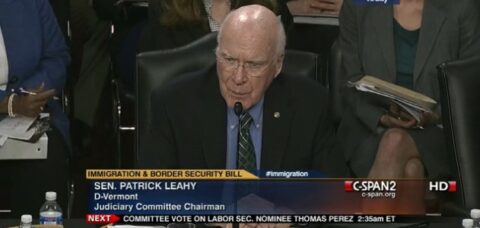Employment and Wages

Immigrants and Their Children Fill Gaps Left by Aging American Workforce
Over the next two decades, as the baby boom generation continues entering retirement, we will experience the largest exodus from the workforce by any generational cohort in American history. This wave of retirees will create a labor force deficit among the millions of jobs baby boomers depart from on top of new job growth industries create. Amid this great demographic shift, immigrants and their children are poised to play a critical role in filling workforce gaps left by massive baby boom generation retirements over the next twenty years, as a new forward-looking report from the Center for American Progress describes. Read More

Busting the Myth of the “Job Stealing” Immigrant
Some critics of the immigration bill now winding its way through the Senate claim that it would increase unemployment among native-born workers—especially minorities—by adding more immigrants to an already tight job market. In fact, both the legalization and “future flow” provisions of the bill would empower immigrant workers to spend more, invest more, and pay more in taxes—all of which would create new jobs. Contrary to the simplistic arithmetic of immigration restrictionists, employment is not a “zero sum” game in which workers compete for some fixed number of jobs. All workers are also consumers, taxpayers, and—in many cases—entrepreneurs who engage in job-creating economic activity every day. Read More

Immigrant Entrepreneurs Grow Industries and Create Jobs
As you might suspect, immigrant entrepreneurs are key drivers in the transportation, food and building services industries. And a recent report from the Immigrant Learning Center (ILC) shines a spotlight on immigrant entrepreneurship in these industries, with a particular geographic focus on Massachusetts, New York, and Pennsylvania. Concerning the three industry areas, the ILC study – through an analysis of public data and interviews with immigrant business owners and industry representatives – finds the following: Read More

Three Ways Immigration Reform Would Make the Economy More Productive
By David Dyssegaard Kallick, Director of the Fiscal Policy Institute’s Immigration Research Initiative. A report just released by the Fiscal Policy Institute, Three Ways Immigration Reform Would Make the Economy More Productive shows that legalization of undocumented immigrants, done right, would do three things to increase economic productivity in the United States. Read More

How the Immigration Reform Bill Could Help Undocumented Farmworkers and Growers
Approximately 11 million undocumented immigrants could become eligible for legal status under S. 744, the immigration reform bill the Senate is considering, including millions of undocumented farmworkers. The importance of finding a way to create a legal workforce within the agriculture industry is critical, as undocumented farmworkers make up an estimated 53 percent of agriculture workers. Read More

How Immigrant Entrepreneurs Fare in the New Immigration Bill
With the Senate Judiciary Committee’s vote last week to pass S.744 on to the Senate floor, a new proposal for spurring immigrant entrepreneurship and innovation will be before Congress. Title IV, Subtitle H of the bill creates the INVEST visa (Investing in New Venture, Entrepreneurial Startups, and Technologies) for immigrant entrepreneurs. This new visa program would allow immigrant entrepreneurs to come to the United States, start businesses, and create jobs in America. There would be two types of INVEST visas. A nonimmigrant INVEST visa would be renewable provided certain initial investment, annual revenue, and job creation criteria are met within an initial three-year period. The immigrant version of the INVEST visa would have basically the same criteria just at higher thresholds. The committee also adopted an amendment that permanently authorizes the EB-5 Regional Center Program, which has created tens of thousands of American jobs and attracted over $1 billion in investments since 2006. Read More

Experts from Left and Right Agree on Economic Power of Immigration Reform
In recent years, study after study has demonstrated a simple yet economically powerful truth about broad-based immigration reform: workers with legal status earn more than workers who are unauthorized—and these extra earnings generate more tax revenue, as well as more consumer spending, which creates more jobs. As a new report from the Center for American Progress (CAP) points out, this fact implies that states with appreciable unauthorized populations stand to gain economically from immigration reform that includes a legalization program for the unauthorized. Moreover, a new open letter to Congressional leaders released by the conservative American Action Forum illustrates that it is not only liberal advocacy groups like CAP which recognize the economic potential of immigration reform. Read More

How the Senate Bill Seeks to Deter Future Waves of Unauthorized Immigration
The Senate Judiciary Committee continues to consider amendments to Title II of the “Border Security, Economic Opportunity, and Immigration Modernization Act’’ (S.744) today. For many, Title II is the bill’s core as it deals with the legalization of the undocumented population already living here and lays out the rules concerning future immigration, among other issues. Read More

The W Visa: Why the Economy Benefits from A Robust New Worker Program
The Senate Judiciary Committee returns to its task of marking up S. 744 tomorrow, taking up, among other things, possible amendments to the W visa program for new nonimmigrant workers. This new program, blessed by both business and labor, is an effort to acknowledge the need for a more flexible system for meeting the demand for workers in certain occupations and industries that require less-skilled workers. At Tuesday’s hearing, several Senators challenged the idea that the American workforce needed to be supplemented with immigrant labor, but the evidence is overwhelming that there is both a need and an economic benefit to having a flexible and responsive program in place to bring in new workers where they are most needed. Read More

Day Two of Senate Immigration Mark-Up Continues With Temporary Employment Visas
On the second day of the Senate Judiciary Committee’s mark-up of S. 744, the “Border Security, Economic Opportunity, and Immigration Modernization Act,” the senators tackled most of the amendments to Title IV after finishing debate on a few border security amendments. The fourth section addresses the majority of non-immigrant temporary visas including those for high and less- skilled immigrant workers, entrepreneurship and innovation programs, as well as a range of miscellaneous visitor visas. Read More
Make a contribution
Make a direct impact on the lives of immigrants.
